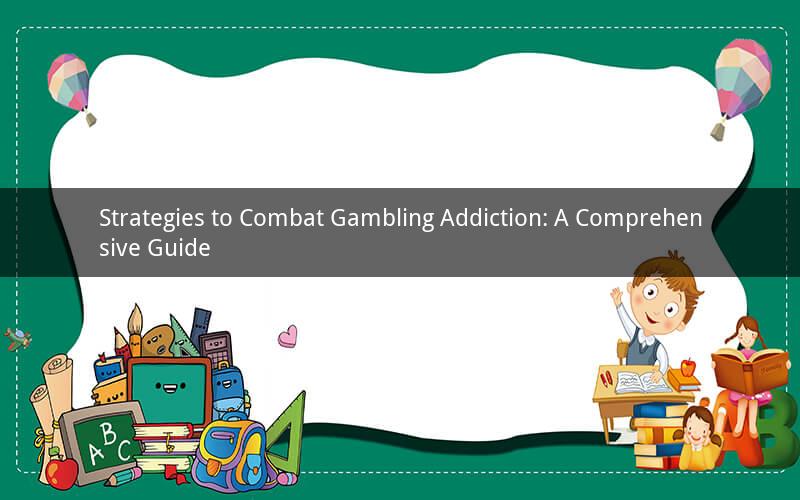
Gambling addiction is a growing concern in today's society, affecting millions of individuals worldwide. The allure of potential wealth and the thrill of the game often lead individuals to develop an uncontrollable urge to gamble. However, this addiction can have severe consequences on one's financial, emotional, and social well-being. This article aims to provide a comprehensive guide on how to combat gambling addiction, offering practical strategies and insights for those struggling with this issue.
1. Recognize the Signs of Gambling Addiction
Identifying the signs of gambling addiction is the first step towards overcoming it. Some common signs include:
- Feeling the need to gamble more money to achieve the same thrill
- Lying to family and friends about gambling activities
- Neglecting personal responsibilities, such as work, school, and family
- Experiencing financial difficulties due to gambling debts
- Feeling restless or irritable when attempting to cut down on gambling
2. Seek Professional Help
Recovering from gambling addiction is a challenging process, and seeking professional help is crucial. Therapists, counselors, and addiction specialists can provide personalized support and guidance. Some treatment options include:
- Cognitive-behavioral therapy (CBT): This therapy helps individuals identify and change negative thoughts and behaviors associated with gambling.
- Contingency management: This approach involves providing rewards for abstinence from gambling and for attending therapy sessions.
- Family therapy: Family therapy can help repair relationships damaged by gambling addiction and provide support for the individual struggling with addiction.
3. Develop a Support System
Building a strong support system is essential for overcoming gambling addiction. This may include:
- Joining a support group: Support groups such as Gamblers Anonymous can provide a sense of community and understanding among individuals struggling with gambling addiction.
- Connecting with friends and family: Reach out to loved ones for emotional support and encouragement.
- Seeking support from colleagues or mentors: Sharing your struggles with individuals who understand the challenges of addiction can provide valuable guidance and support.
4. Create a Gambling-Free Environment
Eliminating triggers and creating a gambling-free environment can help prevent relapse. Consider the following steps:
- Unsubscribe from gambling-related websites and newsletters
- Delete gambling apps from your smartphone
- Avoid visiting casinos, racetracks, and other gambling venues
- Inform friends and family about your commitment to avoiding gambling and seek their support in maintaining a gambling-free environment
5. Develop Coping Skills
Developing healthy coping skills can help reduce the urge to gamble and manage stress. Some coping strategies include:
- Exercise: Engaging in physical activity can improve mood and reduce stress.
- Mindfulness and meditation: These practices can help individuals stay present and avoid engaging in harmful behaviors.
- Hobbies and interests: Focusing on activities that bring joy and fulfillment can distract from the urge to gamble.
6. Set Realistic Goals and Monitor Progress
Setting realistic goals and monitoring progress is essential for maintaining long-term recovery. Some tips include:
- Establish clear, achievable goals for reducing gambling behavior
- Keep a journal to track progress and identify triggers
- Celebrate milestones and adjust goals as needed
7. Stay Committed to Recovery
Overcoming gambling addiction is a lifelong journey that requires commitment and dedication. Stay committed to recovery by:
- Remaining open to feedback and support from others
- Continuing to seek professional help and attend support group meetings
- Learning from setbacks and using them as opportunities for growth
In conclusion, combating gambling addiction is a challenging but achievable goal. By recognizing the signs of addiction, seeking professional help, developing a support system, creating a gambling-free environment, and building coping skills, individuals can take significant steps towards recovery. Remember, staying committed to the process and seeking ongoing support are crucial for long-term success.
Questions and Answers:
1. What are the common signs of gambling addiction?
Answer: Common signs include feeling the need to gamble more money to achieve the same thrill, lying to family and friends about gambling activities, neglecting personal responsibilities, experiencing financial difficulties due to gambling debts, and feeling restless or irritable when attempting to cut down on gambling.
2. How can I seek professional help for gambling addiction?
Answer: You can seek professional help by contacting therapists, counselors, or addiction specialists. Treatment options include cognitive-behavioral therapy, contingency management, and family therapy.
3. What are some coping skills that can help reduce the urge to gamble?
Answer: Coping skills include engaging in physical activity, practicing mindfulness and meditation, and focusing on hobbies and interests that bring joy and fulfillment.
4. How can I create a gambling-free environment?
Answer: You can create a gambling-free environment by unsubscribing from gambling-related websites and newsletters, deleting gambling apps from your smartphone, avoiding gambling venues, and informing friends and family about your commitment to avoiding gambling.
5. What is the most important aspect of overcoming gambling addiction?
Answer: The most important aspect of overcoming gambling addiction is staying committed to the process. This includes remaining open to feedback and support, continuing to seek professional help, and learning from setbacks to grow.